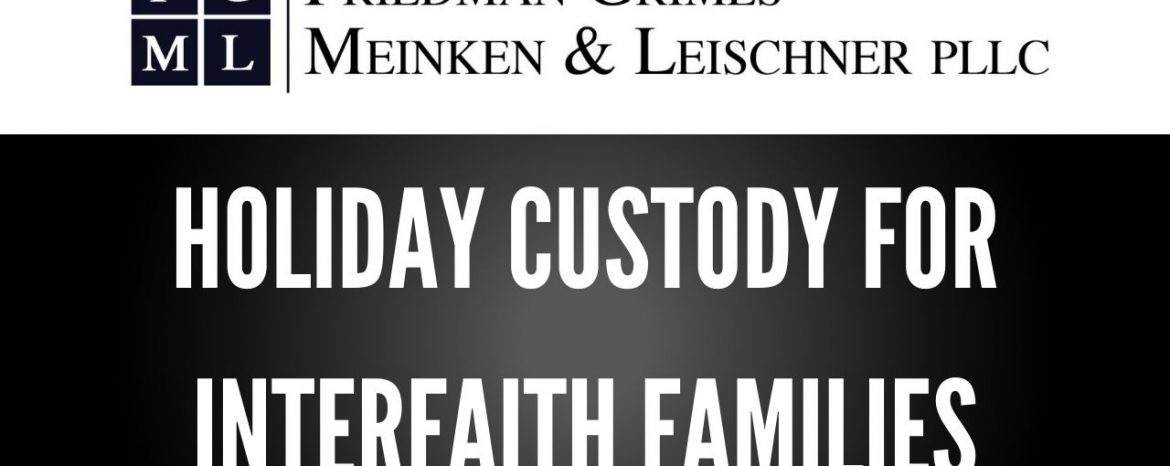Deciding which religion to raise a child in can cause serious conflict during a divorce between parents of different faiths. Attorney Jessica Leischner explains who gets to decide, how holiday custody for interfaith families can be balanced, and what happens if parents can’t reach an agreement.
Religion and Divorce: Who Decides for the Child?
Religion can pose real challenges for divorcing couples from different faiths, when the time comes to decide which religion to raise their children in. When one or both of the parents feels strongly that they have a duty to bring children up in their own faith tradition, conflict often arises.
Leischner explains, “Ultimately, the parent who has legal custody of the children is the one who decides their religion. But that parent cannot prohibit or restrict the children from going to ceremonies or attending religious celebrations in the other parent’s religion while they’re with the other parent.”
If parents can’t decide which religion their children will be raised in, or if they object to their children participating in both faith traditions, the matter will likely end up being decided in court by a judge.
“At the end of the day, just like with any other issue, if you can’t decide then the court is going to decide for you,” says Leischner.
How to Allocate Holidays When Sharing Child Custody
“The other issue I often see in interfaith custodial disputes is how to allocate holidays,” explains Leischner. For parents of school-age children, custodial schedules will usually be determined more by school breaks than by specific holidays.
“In our society in the United States of America, no matter what religion you practice, most people consider the time of holidays from about Christmas Eve to New Year’s Day. That’s the time that people tend to have flexibility from work, that kids are off school, and when parents can celebrate with their children. Most parents are going to get chunks of time off during that winter break, even if they don’t celebrate the religious holidays.” So often, disputes can arise about child custody schedules within that time period.
Legal Options for Resolving Interfaith Custody Disagreements
“I’ve done custody agreements and even custody trials, where parties are arguing about holidays of other religions,” says Leischner. “During Eid al-Fitr in the Muslim religion, a lot of parents want to exchange kids and alternate the times during Eid. Then you have Passover and Rosh Hashanah in the Jewish religion, and Christmas in the Christian faith to name a few. And those can all be worked into a custodial schedule.”
But what if no agreement can be reached? “Then the court can step in and say, ‘if this religion is important to parent A then they’re going to get the kids during that time and find a way to offset it with parent B’,” Leischner explains.
At the end of the day, arriving at an amicable agreement between divorced parents of different faiths about how their children will be raised in their respective religions is ideal. Negotiating and crafting such agreements requires astute and experienced legal counsel.
The alternative — putting the decision in the hands of the court — will produce a custodial agreement which the parents must abide by. It’s a decision that will also affect the children, however, as they attempt to follow one or both parents on their journey of faith.
About the Author

Jessica L. Leischner
Jessica L. Leischner is partner with Friedman, Grimes, Meinken & Leischner PLLC. As an accomplished family law attorney, litigator and mediator serving Northern Virginia, Ms. Leischner represents clients in Fairfax County, Alexandria City, Arlington County, Loudoun County, Stafford County, and Prince William County. Ms. Leischner’s practice is exclusively in the area of family law, including divorce, child custody, visitation, child support, spousal support, equitable distribution, settlement agreements, property rights, post-divorce disputes and other family law matters.
Related Content
- Legal Tips for International Holiday Travel with Children: Custody and Consent Considerations
- How to Navigate Child Visitation During the Holidays
- Smart Co-Parenting Strategies for the Holidays
- What to Know About Child Custody Relocation
- Does Smoking Marijuana Affect Child Custody in Virginia?
- Litigation vs Mediation in Family Law: What is the Difference?

